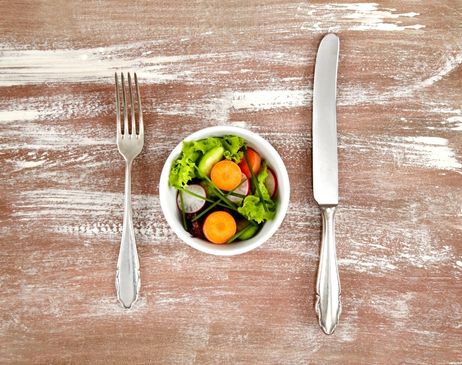How to Stop Snacking
EAT BETTER
How to Stop Snacking

Wondering how to stop snacking? You’re not alone. It’s all too easy to give in to cravings, satisfy your sweet tooth and mindlessly eat throughout the day – and it’s a habit many of us are looking to kick. The only problem with that is it can be easier said than done. We’re here to make life easier and share some tips that have helped many stop snacking as part of a healthy diet.

Why can’t I stop snacking?
There are many reasons why you can’t stop snacking, ranging from the physical to the purely psychological—many of which we’ll cover here. The important thing is to try to identify the source of your impulses in order to understand how to prevent snacking in your daily life.
You can do this by being mindful of when and why you want to eat, perhaps even using a food diary to keep track of you meals and when you feel hunger pangs throughout the day. So, if you’re wondering how to stop snacking, read on and learn more about your habits and why you feel the need to eat.
No snacking — tips and tricks
Snacking is nothing to be ashamed of and something we all do. In fact, healthy snacks can be beneficial to those on a weight loss journey, or indeed trying to maintain their weight. However, mindless snacking, particularly on junk food, can lead you to overeat and cause weight gain. Here are some tips to help you if you find you can’t stop snacking.
1, Drink more water
Hydration is key when losing weight for a number of different reasons, with one of the main ones being that it curbs appetite and helps you feel fuller for longer. Water is a natural appetite suppressant because when the stomach senses it’s full1, it sends signals to the brain to stop eating. Water takes up space in the stomach, reducing hunger and making you feel full. The result? You’ll find it easier to stop snacking since your stomach will feel full with water rather than with unhealthy alternatives.
2, Eat bigger meals
It’s essential you eat enough, as failing to do so will play a part in why you can’t stop snacking2. The hungrier you are, the more difficult it will be to resist the temptation to reach for the chocolate.
Fibre can suppress your appetite, the more viscous the better, as it prolongs a feeling of fullness3. Sources include:
- Beans
- Legumes
- Oats
- Asparagus
- Brussel sprouts
- Flax seeds4
Protein is also highly satiating, reducing hunger and can lead to an automatic reduction in calorie intake5. Chicken, fish, tofu and edamame are all lean sources.
3, Plan ahead
Plan when you’re going to eat and what you’re going to have. Meal prepping can be a great idea to reduce snacking and ensure you’re prepared. You should also bring healthy snacks with you when you’re out and about, such as fruit, nuts and seeds, to ensure you’re less likely to buy unhealthy junk food options.
4, Stock up on healthy foods
Part of the answer on how to avoid snacking is to make it as easy as possible to follow a healthy diet. Swap sweets for fruit, ensure the fridge is stocked with filling, healthy foods and reduce the amount of processed, high-calorie foods in the house.
Things such as dried fruits and berries can stave off sugar cravings, while swapping out orange juice for soda is another healthy alternative that can help you reach your weight loss goals.
5, Distract yourself
Getting constant urges and can’t stop snacking? It can be a good idea to do something else that doesn’t involve food. This could be going for a walk or listening to your favourite music, for example. Drink a glass of water and ask yourself if you still want a snack in 15 minutes’ time – you may have changed your mind.
6, Out of sight, out of mind
Out of sight, out of mind, right? When it comes to food, this is often true for many. Buy less of your favourite unhealthy treats, and keep them out of reach as much as possible. You’re less likely to go for snacks if they’re harder to get to and consume. Try not to buy family-sized or larger portions of junk food also, as you make yourself more likely to find it difficult to stop snacking while temptation is there.
7, Don’t ‘ban’ foods
Often, when we ban or completely eliminate foods, we find it even more difficult to stop snacking. Instead, try practicing everything in moderation. You should also try and stop yourself getting extremely hungry, as this is one of the biggest reasons we experience cravings6. These cravings are also more likely to be for high-sugar, high-fat options.
8, Exercise portion control
Exercising portion control is key for losing weight, as it can help prevent overeating. Weighing and measuring your food can help you know how much you’re eating. Being more mindful and conscious can help learn how to avoid snacking.
9, Use smaller plates
Big plates make your meals look smaller, encouraging you to put more food on there. So, going for a smaller plate can significantly reduce the amount of calories you consume and help you eat less.
10, Determine real hunger
Ask yourself: am I hungry, or just bored? It’s a good idea to get a better understanding of your hunger, whether it’s real, and your cravings, to determine what’s what. Many of us mindlessly eat when we’re bored, making it impossible to stop snacking, so try to tune in to what your body is really telling you more.
11, Spread your meals out
Try to avoid spikes in blood sugar that then dip and can cause energy crashes that make you feel hungrier than normal. To do this, try spreading your meals out evenly throughout the day as part of your approach on how to quit snacking.
It’s also a good idea not to leave it too long between meals, and let yourself get too hungry, as this can lead to the production of ghrelin or the ‘hunger hormone’. Ghrelin increases food intake by up to 30% and thought to play a role in ‘hunger pangs’7.
12, Try intermittent fasting
While it’s not for everyone, intermittent fasting is a popular health trend, which determines when you can eat. It typically involves 16-hour fasts, e.g. eating between 12pm-8pm8. It can lead to an automatic reduction in calorie intake, as well as changes in hormone levels that facilitate weight loss by increasing metabolic rate. Some people find it a helpful tool that allows them to eat less and stop snacking at the same time.
13, Drink coffee
Caffeine alone won’t help you lose weight, however, it can reduce feelings of hunger and your desire to eat at a particular time9. For this reason, coffee can be a good choice of beverage for those trying to learn how to stop snacking. It can also be found in teas and certain supplements.
14, Eat slower
Eating slowly helps you eat less. It takes about 20 minutes for your brain to release fullness hormones that let your brain know you’re full and help you stop eating10. So, slowing down gives your brain time to release these hormones, therefore potentially helping you eat smaller amounts and stop snacking.
15, Turn off distractions
Try to avoid eating in front of the telly, or while looking at your phone or another device. The reason for this is that eating when distracted by electronics makes us more likely to eat more, as we’re not paying attention to our hunger or fullness levels11. So, it can be a good idea to unplug during mealtimes and understand that these devices can be part of the reason you can’t stop snacking.
Move from mindless to mindful eating
It’s easy to eat more than we need, or really want, when distracted and not paying attention to our bodies. But, the more mindful you are, and the more inconvenient you make snacking for yourself, the easier it will be to eat less. This can help you live a healthier life in general, while creating habits that are easy to maintain for the long-term.
For more information on how to stop snacking and much more, explore the XLS blog and work towards your weight loss goals in a healthy and sustainable way.



